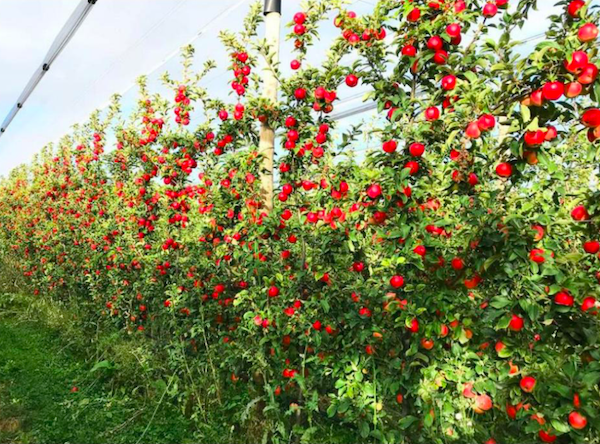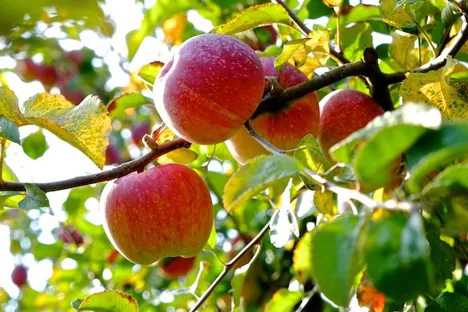Cardell Export has built its reputation around the export of French apples worldwide. The company has indeed been able to adapt to markets with very different expectations. Although a good part of its revenue comes from the French market, Cardell exports to most European countries, as well as to the Asian continent, the Middle East and some markets in Central and South America. This non-exhaustive list of markets is already well supplied and continues to grow. “We are not very present yet in North-America, but we have some prospects for development in Canada,” explains Pierre Gratacos of Cardell Export.

New data which exporters must adapt to
Since the pandemic, exporters have been faced with severe constraints regarding the transportation of their goods. “The markets with which we work remained more or less the same as before the pandemic. But the biggest challenge is that we must now combine the shortage of containers with rates that have been multiplied by 1.5 or 2. This increase is very difficult to pass on to apple prices, a product with low added value.” The conditions to obtain containers is even more restrictive as they are usually redistributed for products that can better absorb these increases in freight costs.
There is now a dip in this increase, but it is far from being significant enough. “What is certain is that we will never go back to the rates from 2019/2020. Additionally, the incompressible costs have increased in recent years, such as production costs (+5 cents), packaging costs (+15 cents, transportation costs). Given this data, we struggle daily to respect the programs with our clients.”
Anticipation: now an essential component for exports
In order to continue to evolve in this new context, exporters have had to demonstrate a great capacity for adaptation and anticipation. “We now have to start programs much earlier, so we must be able to anticipate. We are also forced to ask our clients to commit to the programs we do together, because the financial consequences if they withdraw are felt much more than they used to. Given the freight costs for Asia, we also ask our Asian clients to commit to a certain volume in order to be able to meet their demand. The clients who do not want to commit and prefer to wait for feedback on quality will be served last. Because today, we are also obliged to commit ourselves to production.”
Such anticipation is made even more delicate in the context of climate change that really leaves no room for uncertainty. “This year, we must work with a difficult production and if we want to help the producers, we must sell all the merchandise produced, otherwise we risk losing them. And without production, there will obviously be no trade.”
French market: significant change in purchasing behavior in 3 years
In addition to these new developments, exporters must also continue to adapt to the needs of the markets they serve, whose intrinsic behavior is likely to change at any time. “The Covid crisis has created a real draught on the French market. While consumption remained high with good prices, this was not the case in other European countries or the Asian market. People were too preoccupied to consume, while the French saw home cooking as a way of escaping the oppressive context and having a little fun. We therefore played our cards on the French market, which worked out quite well for us. Today, the situation is completely reversed, with a decline in purchasing power that pushes French consumers to favor quantity over quality. As a result, French consumer’s interest in organic products has decreased.”

French organic certification: a real asset for the Asian market
Not all markets are receptive to it, but some Asian countries are very sensitive to French organic certification, clearly perceived as a guarantee of quality. “Our specifications are much more demanding, and this is a real asset on the Asian market where consumers are well aware that our production meets criteria of excellence. It is therefore a clear entry point to this market. Of course, we must also respect criteria regarding color intensity, size, Brix degree, firmness... It is a market that is very much oriented on quality.”
Middle-East: increasingly competitive price-oriented market
In the Middle-East, the expectations are completely different, with price being the most important factor. This is a difficult position to maintain for Cardell, which has to face increasing competition.
“On this market, organic or conventional, what matters is the price. All the apples of the organic range are perceived in the same way. In the stores, the products are marketed according to the variety and the coloring, but not the origin. We are therefore faced with increasing competition from countries that did not use to have good varieties or efficient packing stations, but now produce a quality that is close enough to ours and sell at prices that are much lower than ours. And in the Middle East, this makes all the difference. For a two-tone apple of the same caliber, we find 5 to 8 competitors. And in this type of market, it is difficult to justify such a price gap for a similar taste, simply by the excellence of the French production. But we do everything we can to maintain our presence in these countries, even if it means we must do less and differently.”
Canada: a potential market
With the decline in North-American apple production, the Canadian market will likely be looking for alternative supplies to meet the demand, a market which Cardell Export would love to work with. “The French-speaking community in North-America is quite receptive to our production method. Canada is looking for niche markets of organic products that are both high quality in terms of taste and production. Our Juliet apple would be the ideal candidate to serve these markets. All the quality certifications of French production are an undeniable asset to meet the requirements of the Canadian market.”
When local takes precedence over organic
In some countries, the pandemic also marked a turning point in consumption habits. “Today, there is an idea that overshadows the organic market, which is the desire to consume more locally, regionally and to develop short circuits. We are often asked to supply as close as possible to our clients’ distribution networks. In Germany for example, people consume first local, then regional, then Austrian, and only then will our German clients come to us and order from the production basin that is closest to them.”
Whatever the difficulties encountered in some areas, Cardell Export wants to maintain its position in its current markets “at all costs”. “When the French market does not absorb all of our production, we must export. Cardell Export searches for new markets that appear according to the opportunities created, but the company also continues to develop the markets where it is already present, even in this context that has evolved so much. We will have to find the mechanisms that will help us maintain our export share. Institutions such as Interfel or ANPP, which promote and defend the quality of French production, provide us today more than ever with essential cross-sector support.”
For more information:
Pierre Gratacos
Cardell Export
